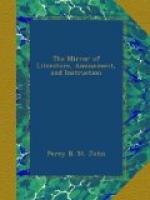THE NATURALIST.
See the Engravings.
A delightful volume, of title almost synonymous with this division of the mirror, has just been published. It is entitled The Journal of a Naturalist,[1] with the very appropriate motto of
——Plants, trees, and
stones, we note,
Birds, insects, beasts, and many rural
things.
The author in his preface, says, “Many years have now passed away since we were presented with that very interesting and amusing book, the ‘Natural History of Selborne;’ nor do I recollect any publication at all resembling it having since appeared."[2] He then acknowledges the impression which this book left on his mind; and its having given rise to the present work, to which, in our humble opinion, it is a worthy companion.
Our “Naturalist” resides in a village upon a very ancient road, connecting Bristol and Gloucester, in a limestone district, numbering among its picturesque beauties, the broad estuary of the Severn, the mountains of Glamorgan, Monmouth, and Brecon, and their peaceful vales and cheerful cottages; Thornbury, with its fine cathedral-like church and castle, the red cliffs of the Severn, and numberless antiquities of our ancestors—as roads, encampments, aggera, watch-hills, coins, lances, and other relics of those warlike times. Labour and healthful enjoyment reign in this district: for it is neither torn up for its mineral wealth, nor are its natural beauties annihilated, or the habits of its population corrupted by speculation or avarice. A portrait of “a worthy peasant,” introduced by our author, reminds us of
——A bold peasantry,
their country’s pride,
When once destroyed, can never be supplied.
A passage quoted by the late Mr. Canning, in one of his finest speeches; and we often contrast this vigorous outline of the people of “merry England” with her artificial state of after times. Next are a page or two of agricultural chemistry (analysis of soils) unfettered with technicals; double the space of what may strictly be called rural economy, (grass lands) succeed; next the culture and history of the potato, and some new observations on “the Teazle.”
Several pages on trees possess great interest, as do those on flowers.
We regret we have room but for a few heads—the maple—the Naturalist’s Autumnal Walk—the Economy of Animals, especially of Birds: we must pass them over to elucidate our engraving of




